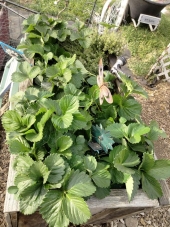
 6
6




Why stick to your guns if they keep shooting you in the foot?
 2
2




 2
2




Invasive plants are Earth's way of insisting we notice her medicines. Stephen Herrod Buhner
Everyone learns what works by learning what doesn't work. Stephen Herrod Buhner
 4
4




K Kaba wrote:I'd wait til the brood is done before planting trees, and if it's too late, plant the trees next year. Cicada broods can kill young trees.
Why stick to your guns if they keep shooting you in the foot?
 2
2




Weeds are just plants with enough surplus will to live to withstand normal levels of gardening!--Alexandra Petri
 4
4




 4
4




Gardens in my mind never need water
Castles in the air never have a wet basement
Well made buildings are fractal -- equally intelligent design at every level of detail.
Bright sparks remind others that they too can dance
What I am looking for is looking for me too!

 4
4




Someone bred a specific daikon for this sort of job.K Kaba wrote:Ah! I'd reach for daikons then, maybe with a mix of a nitrogen fixing annual.
Visit Redhawk's soil series: https://permies.com/wiki/redhawk-soil
How permies.com works: https://permies.com/wiki/34193/permies-works-links-threads
 1
1




Gardens in my mind never need water
Castles in the air never have a wet basement
Well made buildings are fractal -- equally intelligent design at every level of detail.
Bright sparks remind others that they too can dance
What I am looking for is looking for me too!





Invasive plants are Earth's way of insisting we notice her medicines. Stephen Herrod Buhner
Everyone learns what works by learning what doesn't work. Stephen Herrod Buhner
 1
1




Why stick to your guns if they keep shooting you in the foot?

|
rubbery bacon. rubbery tiny ad:
Learn Permaculture through a little hard work
https://wheaton-labs.com/bootcamp
|


